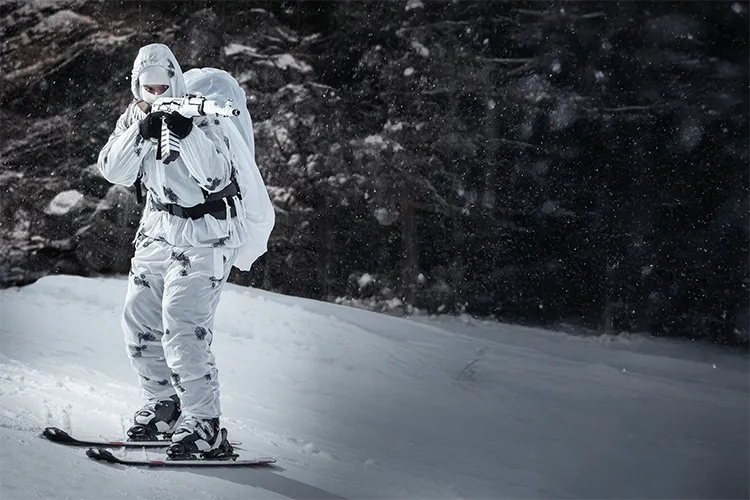

Geopolitical Hotspot
Tim Marshall argues it’s time for the UK to consider Finland’s model for national preparedness
The UK needs to rediscover its inner sisu. That is, assuming it still has it.
Sisu, a Finnish word, has no direct translation, but it refers to communal stoicism, extraordinary resoluteness and courage in the face of adversity. Think Dunkirk. Launching the UK’s Strategic Defence Review this month, Prime Minister Starmer said: ‘Nothing works unless we all work together.’ Shades of sisu there.
The Finns regard it as their national character. It was most famously on display during the 1939–40 Winter War against the USSR, when Finland defended valiantly against an invasion by an enemy more than 60 times its size. Now, it’s embodied in the Comprehensive Security Model (CSM) – a whole-of-society resilience strategy. The CSM prepares Finnish society for a rapid response to potential threats, the most pressing being a resurgent Russia engaged in a ‘grey war’ of subversion across Europe, and open armed conflict in Ukraine.
Finland integrates the military with civilian bodies to ensure the state can function under extreme pressure. At the heart of the CSM is the National Emergency Supply Agency. It stockpiles fuel and food for military and civilian use, oversees delivery systems and ensures essential goods can be produced during emergencies.
Individual preparedness is key, via the ‘72 hours concept’. Citizens are encouraged to maintain enough water, food and medical supplies to last at least three days. This preparedness is thought to boost psychological resilience in the face of catastrophe.
Subscribe to Tim Marshall’s Substack here: https://substack.com/@itwitius
Finnish law stipulates that all buildings exceeding 1,200 square metres must include a bomb shelter. There are more than 50,000 shelters – enough space for almost five million people out of a population of 5.6 million. These shelters are designed to withstand structural collapse and radiation, and some are multi-purpose. In Helsinki, for instance, a public swimming pool can be drained and converted into a shelter for 3,800 people within three days.
This whole-of-society mindset stems from Finland’s geographic position. However, the further from Russia you get, the more complacent countries appear to be.
Germany has shelters for just half a million people. The remaining 83.5 million? Perhaps they’ll hide under tables. France plans to issue a ‘survival manual’ advising citizens on what to do in the event of a nuclear explosion – namely, close all your doors. The UK boasts a ‘bold and comprehensive plan’ for resilience, but this doesn’t include building shelters. Government strategy champions transparency to ‘empower everyone to make a contribution’, but there’s little sign of actual empowerment. The ‘Prepare’ website exists, but few visit it.
Moscow is already conducting hybrid warfare. Russia has attacked undersea cables and pipelines linking Europe’s energy and communications networks. It has carried out radiological and chemical weapons attacks in the UK and murdered dissidents in Europe. Last year, Polish security services reported that parcel bombs detonated at logistics depots in Leipzig, Warsaw and Birmingham were part of a Russian test plot aimed at triggering explosions aboard cargo flights. Russia also routinely engages in cyberattacks and disinformation campaigns during elections.
The EU is developing a union-wide resilience strategy, including stockpiling essential goods. But national governments are ultimately responsible for the safety of their citizens – and many are woefully unprepared. The French survival manual will urge citizens to join military reserve units, but for many young people, the armed forces are a foreign concept.
Enjoying this article? Check out more geopolitics by Tim Marshall…
Conscription isn’t politically viable for many nations, though Nordic and Baltic states use it to help foster social cohesion. Proximity to Russia sharpens the mind.
In Finland, more than 80 per cent of people are willing to contribute to national security. In contrast, a recent UK survey of 18–27-year-olds revealed that only 11 per cent would fight for Britain, while 41 per cent said there were no circumstances in which they would take up arms. Trust in government and media is also lower in the UK than in the Nordics. The UK’s national defence plans haven’t been updated in 25 years, and no-one seems sure who’s responsible for what. This is a poor basis on which to build sisu.
In autocracies such as Russia, civil defence can be enforced and narratives manipulated. In democracies, leaders must persuade the public. That means stronger messaging on the need for national resilience – and real action to match. Reminding society of the value of ‘blood, toil, sweat and tears’ – a homegrown version of sisu – is one of the great challenges of our age.




